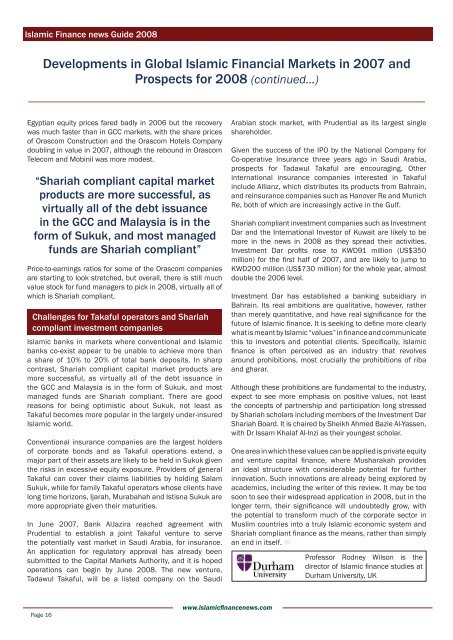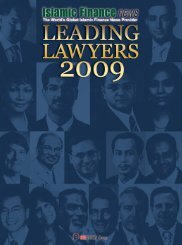Create successful ePaper yourself
Turn your PDF publications into a flip-book with our unique Google optimized e-Paper software.
<strong>Islamic</strong> <strong>Finance</strong> news Guide 2008<br />
Page 16<br />
Developments in Global <strong>Islamic</strong> Financial Markets in 2007 and<br />
Prospects for 2008 (<strong>continued</strong>...)<br />
Egyptian equity prices fared badly in 2006 but the recovery<br />
was much faster than in GCC markets, with the share prices<br />
of Orascom Construction and the Orascom Hotels Company<br />
doubling in value in 2007, although the rebound in Orascom<br />
Telecom and Mobinil was more modest.<br />
“Shariah compliant capital market<br />
products are more successful, as<br />
virtually all of the debt issuance<br />
in the GCC and Malaysia is in the<br />
form of Sukuk, and most managed<br />
funds are Shariah compliant”<br />
Price-to-earnings ratios for some of the Orascom companies<br />
are starting to look stretched, but overall, there is still much<br />
value stock for fund managers to pick in 2008, virtually all of<br />
which is Shariah compliant.<br />
Challenges for Takaful operators and Shariah<br />
compliant investment companies<br />
<strong>Islamic</strong> banks in markets where conventional and <strong>Islamic</strong><br />
banks co-exist appear to be unable to achieve more than<br />
a share of 10% to 20% of total bank deposits. In sharp<br />
contrast, Shariah compliant capital market products are<br />
more successful, as virtually all of the debt issuance in<br />
the GCC and Malaysia is in the form of Sukuk, and most<br />
managed funds are Shariah compliant. There are good<br />
reasons for being optimistic about Sukuk, not least as<br />
Takaful becomes more popular in the largely under-insured<br />
<strong>Islamic</strong> world.<br />
Conventional insurance companies are the largest holders<br />
of corporate bonds and as Takaful operations extend, a<br />
major part of their assets are likely to be held in Sukuk given<br />
the risks in excessive equity exposure. Providers of general<br />
Takaful can cover their claims liabilities by holding Salam<br />
Sukuk, while for family Takaful operators whose clients have<br />
long time horizons, Ijarah, Murabahah and Istisna Sukuk are<br />
more appropriate given their maturities.<br />
In June 2007, Bank AlJazira reached agreement with<br />
Prudential to establish a joint Takaful venture to serve<br />
the potentially vast market in Saudi Arabia, for insurance.<br />
An application for regulatory approval has already been<br />
submitted to the Capital Markets Authority, and it is hoped<br />
operations can begin by June 2008. The new venture,<br />
Tadawul Takaful, will be a listed company on the Saudi<br />
www.islamicfi nancenews.com<br />
Arabian stock market, with Prudential as its largest single<br />
shareholder.<br />
Given the success of the IPO by the National Company for<br />
Co-operative Insurance three years ago in Saudi Arabia,<br />
prospects for Tadawul Takaful are encouraging. Other<br />
international insurance companies interested in Takaful<br />
include Allianz, which distributes its products from Bahrain,<br />
and reinsurance companies such as Hanover Re and Munich<br />
Re, both of which are increasingly active in the Gulf.<br />
Shariah compliant investment companies such as Investment<br />
Dar and the International Investor of Kuwait are likely to be<br />
more in the news in 2008 as they spread their activities.<br />
Investment Dar profi ts rose to KWD91 million (US$350<br />
million) for the fi rst half of 2007, and are likely to jump to<br />
KWD200 million (US$730 million) for the whole year, almost<br />
double the 2006 level.<br />
Investment Dar has established a banking subsidiary in<br />
Bahrain. Its real ambitions are qualitative, however, rather<br />
than merely quantitative, and have real signifi cance for the<br />
future of <strong>Islamic</strong> fi nance. It is seeking to defi ne more clearly<br />
what is meant by <strong>Islamic</strong> “values” in fi nance and communicate<br />
this to investors and potential clients. Specifi cally, <strong>Islamic</strong><br />
fi nance is often perceived as an industry that revolves<br />
around prohibitions, most crucially the prohibitions of riba<br />
and gharar.<br />
Although these prohibitions are fundamental to the industry,<br />
expect to see more emphasis on positive values, not least<br />
the concepts of partnership and participation long stressed<br />
by Shariah scholars including members of the Investment Dar<br />
Shariah Board. It is chaired by Sheikh Ahmed Bazie Al-Yassen,<br />
with Dr Issam Khalaf Al-Inzi as their youngest scholar.<br />
One area in which these values can be applied is private equity<br />
and venture capital fi nance, where Musharakah provides<br />
an ideal structure with considerable potential for further<br />
innovation. Such innovations are already being explored by<br />
academics, including the writer of this review. It may be too<br />
soon to see their widespread application in 2008, but in the<br />
longer term, their signifi cance will undoubtedly grow, with<br />
the potential to transform much of the corporate sector in<br />
Muslim countries into a truly <strong>Islamic</strong> economic system and<br />
Shariah compliant fi nance as the means, rather than simply<br />
an end in itself.<br />
Professor Rodney Wilson is the<br />
director of <strong>Islamic</strong> fi nance studies at<br />
Durham University, UK

















